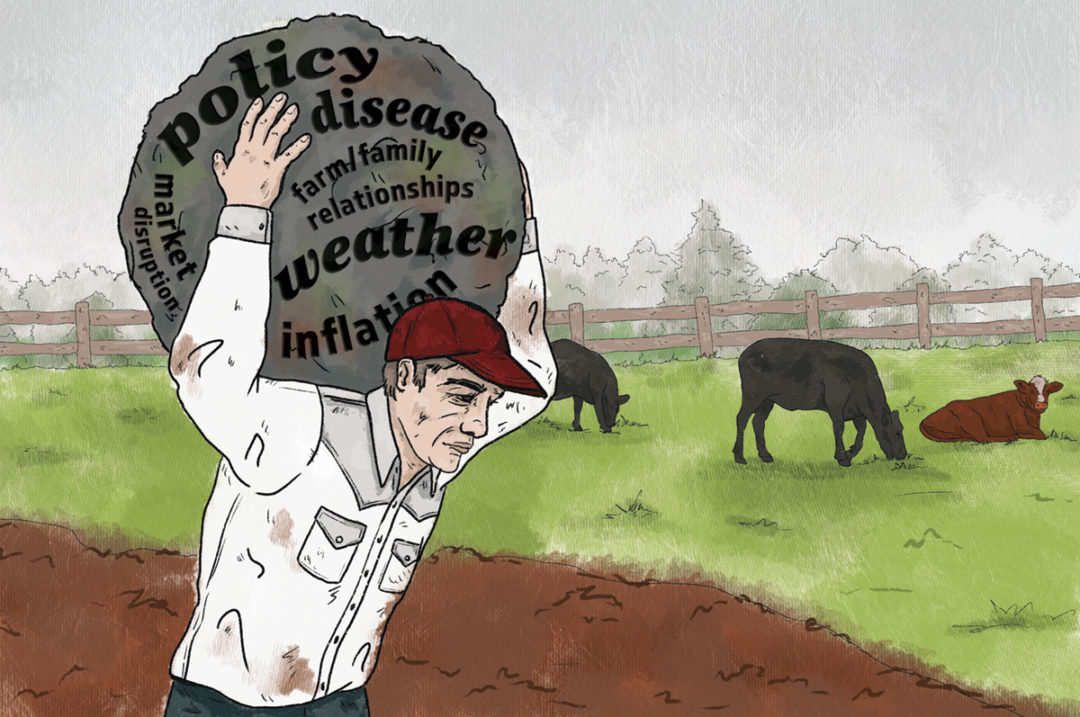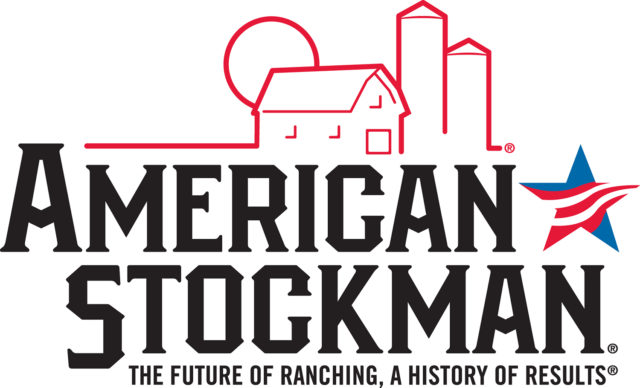Cattle producers and ranchers experience many situations that can lead to stress, anxiety, depression and substance misuse. They tend to experience work/home imbalances, social and geographic isolation and potential for financial losses, often due to factors outside their control, such as weather, changes in input and commodity prices, media and social criticism, and bureaucracy.
In addition to these stressors, cattle producers face unique challenges in caring for and maintaining the well-being and productivity of animals. Sick or injured animals can result in financial losses, increased labor and emotional stress. When an individual has primary responsibility for livestock care and experiences financial outcomes tied to livestock health, repetitive interactions with livestock can reinforce negative feelings during hardships. Still, the stress associated with caring for sick or distressed animals often exceeds concerns for financial loss. Research documents “compassion fatigue,” stress and related mental health concerns among animal caregivers, including veterinary professionals and livestock producers.
Animal welfare has been shown to affect livestock caretakers’ well-being, which in turn affects producers’ motivation and ability to care for their cattle. Some studies have found a link between animal care and positive mental health outcomes, but these studies focus on interaction with animals rather than herd management. Decreased care of livestock or farmstead is often an outward sign of depression. However, changes in management and upkeep can also reflect labor shortages, aging and other concerns.
Livestock production is seasonal, and each season is a part of the specific operation’s production system, which brings new annual challenges and unique stressors for producers. For example, during calving, producers often experience a lack of sleep and irregular sleep routines, both of which can be associated with depression. Further, sleep disruption is often worst during extreme weather, which increases newborn calf morbidity and adds another source of stress. Hay season is another stressful period for many livestock producers and requires many long days and cooperation from the weather. Cattle marketing often leads to concern, or anxiety, about whether the hard work, time and effort put into raising the animals will be rewarded or thwarted by constantly fluctuating market prices.
The past couple of years have introduced unique stressors, such as the Tyson beef-packing facility fire in Holcomb, Kansas, in August 2019 and COVID-19. The worst was felt during the external event of the COVID-19 pandemic when cattle producers saw a drop in cattle prices driven by COVID-19-related plant shutdowns and changes in meat demand related to shifts from restaurant dining to at-home cooking. During that time, cattle producers that raised a live animal and fed it out in a feedyard incurred substantial feeding costs. Additionally, the price per pound for fed cattle declined, which induced financial stress for feeders and retained ownership producers in terms of when to sell. Thus, during the pandemic, cattle producers throughout the supply chain endured much stress.
Additionally, various established and proposed government policies can require significant effort to understand or access. There has been particular attention in the policy arena on cattle and the beef industry in recent years. The beef processing sector of the supply chain is highly concentrated and high beef prices at the time of low cattle prices during recent disruptions have caused consternation among producers and policymakers. Multiple pieces of proposed legislation have led to significant discussion and disagreement among producers about impacts on the future of the industry.
Role for extension economists
Many ranch stressors (i.e., weather, disease, market disruptions, farm/family relationships and policy) are almost impossible to eliminate and are not controllable by cattle producers. However, resilience can be learned and encouraged. Extension plays a crucial role in resilience education among livestock producers.
A number of scholars have advocated for further research into the connection between human well-being and animal welfare. Applied research and related extension/outreach efforts may be able to address such concerns simultaneously. In fact, researchers insist that resilience “needs to be understood in the context of wider social and economic systems” and tie resilience to general farm profitability concerns. Several of these concerns – including business planning, income security and risk management – are firmly in the purview of extension economists. Helping producers understand policies that impact their operations is another area well within traditional extension goals.
Including topics on mindfulness and other social aspects can be done in traditional livestock extension programming. In some cases, agricultural professionals may be trained to deliver mental health programming, and they may also partner with other disciplines and organizations. Texas AgriLife extension has successfully addressed mental health and mindfulness topics with farmers and ranchers through regular farm and ranch programming. Incorporating mental health topics into extension and other educational programming may normalize discussing mental health among farmers and provide information to producers before crises.
Integrated programming does not preclude programming with a specific mental health focus. Mental Health First Aid, an international program employed by many extension agencies, has a rural certification for trainers to focus on mental health within rural communities with limited mental health resources and long distances to such services. Other institutions offer different programs: Mississippi State University extension hosts the Preventing Opioid Misuse in the Southeast (PROMISE) initiative as well as “R is for Rural and Resilient” webinars addressing mental health education within agricultural and rural contexts.
While awareness and educational opportunities continue to evolve, it is important for educators and policymakers to realize that attitudes about mental health change over time and, usually, in the context of long-term, trust-based relationships. Including mental health information in a variety of programs and formats may help familiarize livestock producers with mental health resources and remove barriers to talking about stress and depression.
For farmers and ranchers looking to access mental health resources now, resources include:












